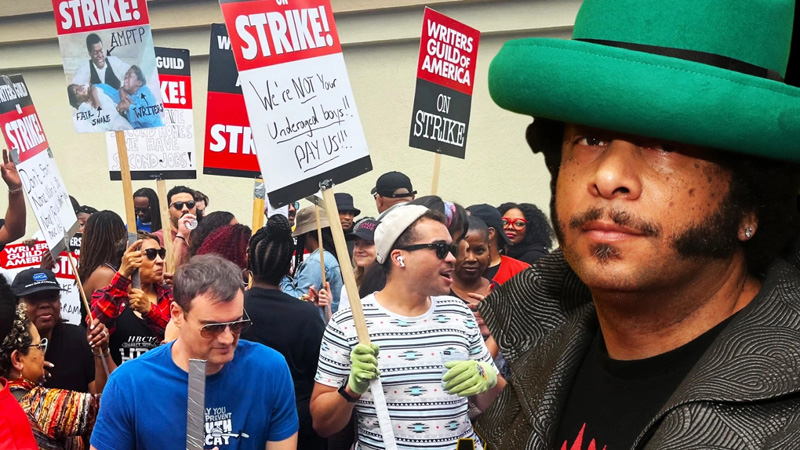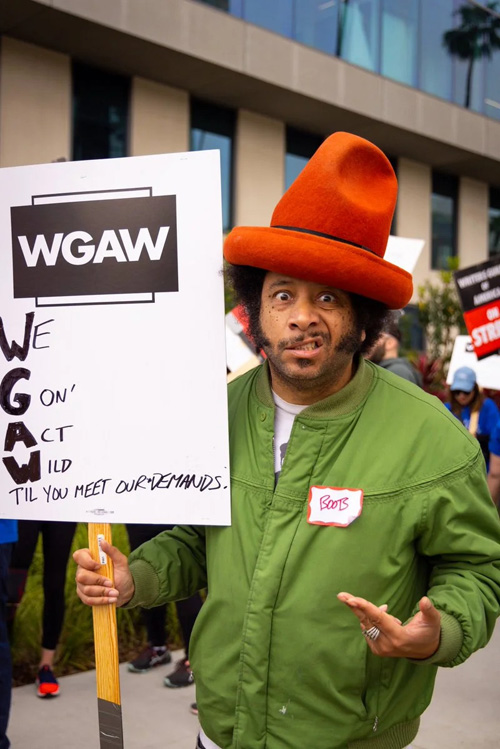
Rosy Cordero/Getty
Boots Riley (Guest Column) | Deadline
I’m in the Writer’s Guild of America, and I’m also in the Directors Guild of America. I’m one of those so-called multi-hyphenates.
I knew this strike was coming, but originally thought, based on what happened in 2007, the labor action would be relegated to “writing duties.”
I thought I’d be able to promote my series that I’d created, directed, co-showrun and worked on for four years. Now the show will likely come out during this strike which means I won’t be able to promote it at all.
Like so many others, I found out, the weekend before the strike started, that this time the WGA would be stepping it up and the call was for there to be no WGA members doing any work at all for the studios — including doing post on or promoting their shows.”
I understood this to be a brilliant play by the WGA and one that would definitely cause pain to the studios and make negotiations go faster. In context, the AMPTP had been making some plays of their own- including pushing writers across all the studios to speed up their work to turn in scripts so that they could be “banked” to help studios weather the strike, thereby pro-longing the strike.
But even though I understood that, I couldn’t help but feel some depression about my personal situation and what I’d be sacrificing- and then feel really conflicted about even having those feelings.
For further context: I’ve made art — songs, music videos, theater, and movies — about political struggles, for all of my life.
Since the age of 14, I’ve also been involved in helping people organize on their job — from farmworkers to fast food workers. I’ve helped out with strikes. I’ve helped Greyhound bus drivers and Watsonville cannery workers keep out scabs, helped call for and organize the Occupy Oakland general strike, which had 50,000 people march, join with longshore workers and shut down the Port of Oakland. I’ve worked in factories and distribution centers and been a Teamster.

Photo by Angela Treviño
But this is the first time I’ve actually been on strike myself.
You’d think that when I was told that I shouldn’t promote my show, having been an organizer, it’d have been an easy choice with no second thoughts.
But it wasn’t, it was a really hard thing to process. Hard partly because I’m an artist who has become a little narcissistic as I’ve had to think that whatever art I’m doing is the most important thing in the world- just to push through the many obstacles and get it done.
No part of me thought that I wasn’t going to do the right thing. But if it’s hard for me, think about how this act of solidarity is obviously hard for many others with projects just as dear to them, but who have not had the experiences I’ve had.
Further complicating things, the DGA sent out a letter to its hyphenate members who were also WGA, clarifying that the DGA can’t legally advise its members to stop working. But in the face of all of that, multi-hyphenate WGA members, showrunners and directors, in droves, have stopped all work on their projects — sacrificing and showing a level of solidarity that was not seen in the 2007 strike.
This level of solidarity is being seen all across the industry, with teamsters and IATSE members refusing to cross WGA picket lines, and inspiring stories like the office full of VFX workers walking off in support of a WGA picket.
This solidarity isn’t coming out of nowhere. And the cultural and political context that brought people to this point is the same reason this strike is so important.
Over the past three years, according to labor news site PayDayReport, there have been over 2900 strikes and work stoppages in the US, making this the biggest US strike wave since the 1940s. Many of these strikes are in workplaces that were not unionized, others were forced by the membership against the advice of their old-school leadership. Most of these strikes are only talked about in local news and most mainstream national news outlets won’t talk about it in context. The US Bureau of Labor Statistics only counts strikes of 1000 people or more, which is ridiculous (the fictional strike in Sorry To Bother You was only 500 people, it wouldn’t have been counted). .
We’re at a new juncture.
People are looking for ways to control the world around them and are finding that since the motor that propels capitalism, what creates wealth and power, is the exploitation of labor, their power comes not from simply letting their voices be heard, but from their ability to withhold their labor.
And these struggles are not just for their much needed pay raises and benefits, some are radical in nature. A couple years ago, we saw Boeing workers strike, demanding that instead of making jets engines during the pandemic, they make respirators for those in need.
Here in Oakland, where I live, this past week, Oakland teachers on strike have won their set of Common Good proposals, which will allow teachers, parents, and community members to collectively decide on what is done with the resources allotted to the school district. People are using their power to reimagine power relations.
In the context of all of this, this WGA strike is one of the most visible of those thousands of strikes. What we do right now will be part of the story that tens of millions tell themselves about how the world works and what tools we have with which to change it.
There are forces that would love for the AMPTP to win this, in order to say “See, strikes don’t work, so there’s no need for unions”. A strike, or the viable threat of one, is the only thing that gives a union power. So, this strike will be pivotal in regards to this new strike wave and the future of organizing on the job.
Many of the issues that the WGA is fighting for are classic ones that everyone can relate to- stopping the push for more work and less pay, hiring more people, training people, and increasing pension contributions, etc. (For those outside of the industry that may read this, I’m one of the lucky ones who has my own show, but most are not where I’m at. There are testimonials out there from writers who are staffing writer’s rooms who have to get EBT, others from someone heading up a Netflix show who had to steal food from the Netflix cafeteria to feed their family, etc, and everything in between)
But one of the demands that the WGA has laid out and one that can be won through the unity of the WGA, DGA and SAG-AFTRA is around an existential threat that so many people are complaining about or scared of, but feel powerless to control: AI.
For so much of history, technology gets wheeled out to us and we’re just told how it’s gonna go with no say in it. “We’re gonna be able to monitor your every move now. Don’t like it? Fuck you, write a think piece.” It ends up being one more sentence in an argument that makes the average person feel powerless.
Besides AI potentially killing film and TV industry jobs and basically being a stealing machine, producing soulless dreck, it’s insidiously working its way through many facets of our lives — eventually allowing its wielders unscrupulous control over culture and even thought processes in ways more thorough than before.
Separately, there’s a hurt in my stomach, a feeling of despair that comes over me whenever a friend sends me an AI image. I usually know it’s AI, and that’s because what I want out of art is passion from another human being. I don’t care if the lines look interesting. The despair comes from a sense that this is just how the world will be, and I have no say in that.
But here we have the only thing that could possibly regulate the use of technology- the withholding of labor. And we’re doing it at a time when it’s actually possible to win. AI doesn’t yet represent an actual dollar amount yet, so- especially if the DGA and SAG-AFTRA join in on that AI demand- we can get that concession. These corporations aren’t gonna regulate themselves and by the time congress pretends to wanna do something, it’ll be too late.
The world seeing us win this, seeing us shaping the future by stopping the wheels of industry — that will inspire many tens of millions of people.
This is why you have so many people willing to shut things down, even at personal cost. It’s what brought me back to earth during that aforementioned second thought. What we have now is only because someone else sacrificed for us in some, fight, struggle, or strike in the past. Similarly, this sacrifice, and the win that comes with it, will give us something to talk about for the rest of our lives.
The AMPTP are led by people who would never make that kind of sacrifice — and that’s exactly the reason this strike will win.
We’re a bunch of storytellers and we’re telling a story now in real life. It’s the most important story we can tell, one that will actually help shape a movement that changes people’s lives.
Could be the best ending you ever write.
